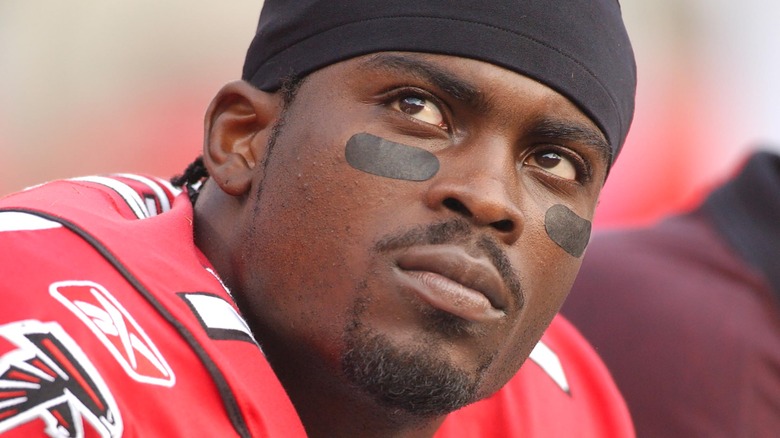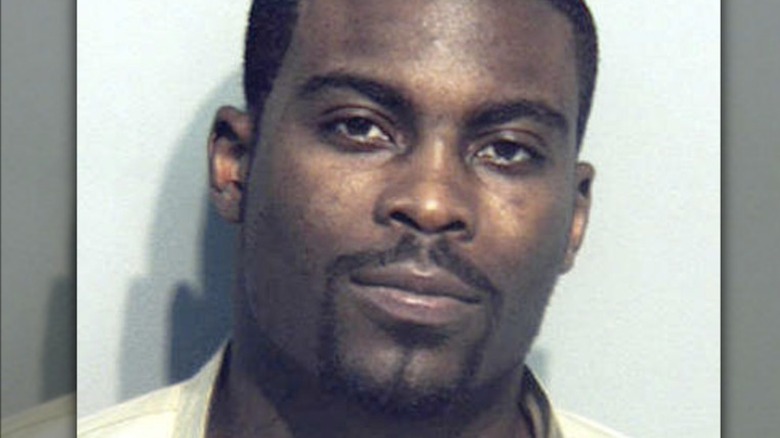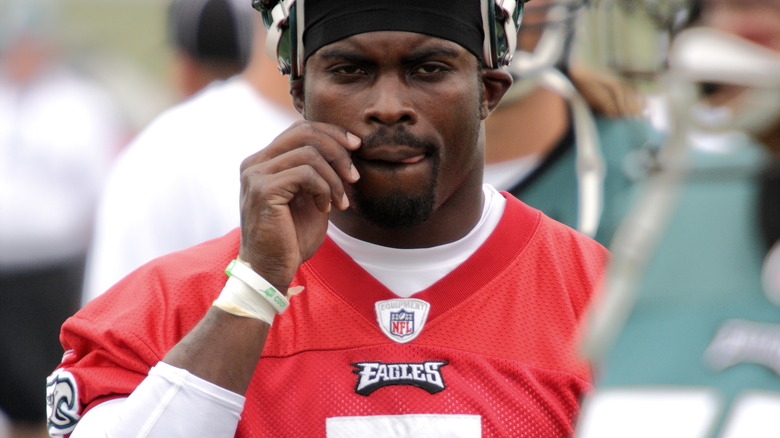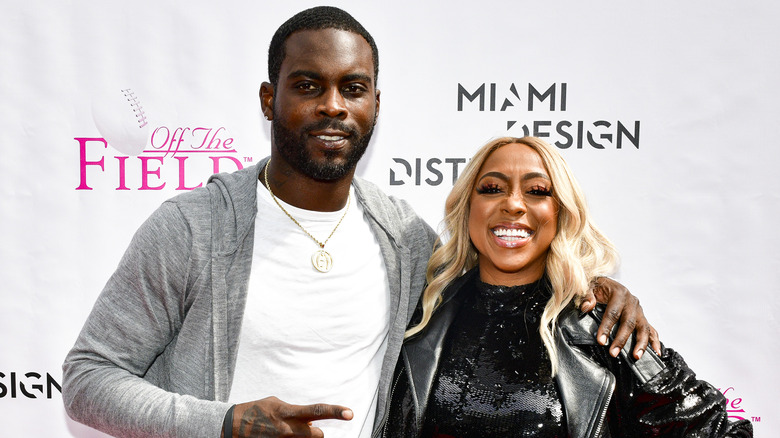What Michael Vick's Life In Prison Was Really Like
This article contains descriptions of animal cruelty.
Michael Vick is a sports star who ruined his career in a matter of seconds. The quarterback's NFL dreams went from bright to bleak after he was apprehended and thrown into prison. ESPN reports that in 2001, Vick and three others started an illegal dogfighting business in Virginia. Bad Newz Kennels bred and trained dogs to fight, dispatching them around the U.S. to compete. After catching the attention of authorities, Vick was arrested in 2007 on charges of "conspiring to engage in competitive dogfighting, procuring and training pit bulls for fighting, and conducting the enterprise across state lines."
Following Vick's arrest, Donna Reynolds visited Bad Newz Kennels with a federal agent to assess which dogs could be rehabilitated and rehoused. The animal rights activist wrote about the experience on her organization's website, BadRap blog. She detailed some of the atrocities committed there, including torture, drowning, electrocution, and the hanging of "underperforming" dogs.
After initially protesting his innocence, Vick pleaded guilty to "conspiracy in connection with an illegal, interstate dogfighting enterprise," per Reuters. He apologized for his actions as he left court. "Dogfighting is a terrible thing, and I do reject it," he told reporters. "I will redeem myself. I have to." The NFL commissioner condemned Vick and suspended him without pay. "Your admitted conduct was not only illegal but also cruel and reprehensible," Roger Goodell wrote to the athlete, per ESPN. The disgraced athlete was sentenced to 23 months in prison and ordered to undergo drug treatment. So, what was Vick's life in prison like?
Michael Vick's life in prison helped him grow
Micheal Vick spent 19 months in club Fed before catching a chain on early release in May 2009, per ESPN. Vick had lost all his money and was jobless. So, the disgraced quarterback went on a charm offensive to rehabilitate his image, talk about doing time, and promote his book, "Finally Free."
Vick had discovered that transferring from Atlanta Falcons No. 7 to Leavenworth felon No. 33765-183 was no biggie. During an interview with "Highly Questionable," Vick said being fresh meat on day one "was rough." However, knowing that everything on the outside was carrying on as usual without him frightened Vick way more. "Your life stopped," he said. "That's the scary part." Vick boasted that his juice card helped him become a shot caller, ensuring his safety at all times, and claimed 70% of inmates believed he should've been free.
Vick knew "deep down" the dogfighting operation was "morally wrong," but said he'd no clue it could lead to people "losing their freedom." He said he wasn't "bitter" about being banged up, though, because it helped him "grow." Vick shared he'd also helped his fellow prisoners grow by giving the grapes on how to improve their illegal sports gambling odds. "They had their little own brackets and little things going on, getting insight from me," he told USA Today. "I gave it to 'em. I can't say I was always right. I was right a majority of the time."
Michael Vick made a roaring return to the NFL
Michael Vick's NFL celeb career was never quite the same after being locked up. Per History, Vick was 27 years old when he was incarcerated. He was also the highest-paid player in the NFL after signing a $130 million 10-year contract with the Atlanta Falcons. However, when Vick pleaded guilty to "conspiracy to travel in interstate commerce in aid of unlawful activities and to sponsor a dog in an animal fighting venture," he lost everything.
The NFL suspended Vick indefinitely without pay and permitted the Falcons to terminate their contract with him. Not surprisingly, Vick also lost all of his sponsorship deals. But when he left prison 23 months later, Vick's biggest problem was public perception. His apology interviews did little to help, with many doubting Vick's sincerity and contrition. GQ reports he hired "at least seven" consultants to help rehab his image. They arranged for Vick to work with the Humane Society. He lobbied for the passage of anti-dogfighting legislation and talked about animal cruelty to school kids.
Per NFL, Vick made a roaring and record-breaking return to the field. In 2009 he signed with the Philadelphia Eagles and won "Comeback Player of the Year" in 2010. He played for the New York Jets and the Pittsburgh Steelers in the last two years of his career. Then, in 2017, Vick retired, having racked up "the most career rushing yards by a QB in NFL history."
Michael Vick remains a polarizing figure
Michael Vick caused a media storm in 2012 after news broke that he owned a dog again. "I understand the strong emotions by some people about our family's decision to care for a pet," he said, per ESPN. Vick explained that he wanted his kids to form a close and loving bond with animals and learn to respect them. "Our pet is well cared for and loved as a member of our family," the quarterback vowed.
Vick's undeniable skills on the field had won over football fans following his release from prison. But PETA? Not so much. The animal rights group had extreme feelings about Vick and didn't hold back from sharing them. They drew attention to a (now deleted) video of Vick post-incarceration. "Did you see any remorse in his eyes?" PETA asked. "Vick shows as much remorse for the dogs he abused as he did his first night out of prison when he went to a strip club."
Meanwhile, an op-ed in the Chicago Tribune argued that Vick "deserves our forgiveness." They conceded that the athlete admitted to "the strangling and beating deaths of dogs — and to personally drowning them." However, they believed he'd earned the mercy of the public. The paper listed the post-prison outreach work Vick performed and the number of kids he'd spoken to about animal cruelty. "Redemption is something to celebrate," they concluded. "And the only people who can be redeemed are those who have done wrong."




